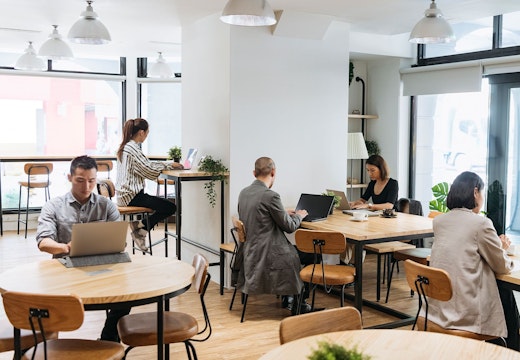New green deal: creating a sustainable working environment
Flexible work has opened up new opportunities to run a cleaner, greener business – but how will organisations embrace this opportunity for change?
The moral and social responsibility placed on businesses to contribute to the fight against climate change is increasing every day. Even though Covid-19 has dominated the global conversation over the past two years, the issue of living our personal and professional lives more sustainably hasn’t gone away.
It’s not just society as a whole that is expecting businesses to play their part: employees want their organisations to make a positive contribution, too. According to research from Gallup, two-thirds of employees aged under 30, and almost half of those aged between 30 and 49, have concerns about climate change.
But what does this mean for businesses in practice? How can they take meaningful steps to reduce their carbon footprint, maximise efficiencies and demonstrate to the world that they can be successful without unnecessarily harming the environment? The answer to these questions lies in three key areas: people, buildings and technology.
People
Let’s start with the workforce, whose actions may make the biggest and most visible difference day-to-day. If you think about the way office-based businesses operated pre-pandemic, it’s vastly different to how things have evolved now: all those people commuting to and from work five days a week, often in their own cars, to sit at a desk at designated times. And the only reason why it was that way was because that’s the way it’s always been.
Then remote work came along as the pandemic took hold, whether companies liked it or not. Suddenly, their eyes were opened to the possibilities of more flexible ways of working, mainly led by the efficiencies they could find from an operational standpoint. But alongside that, there are environmental benefits to be found, too.
If employees are able to do many aspects of their job effectively at home, and only really need the office for specific purposes like in-person meetings, then why can’t they get the best of both worlds? By helping employees cut their commuting demand to two or three days a week instead of five, employers can make huge savings in their overall carbon footprint with no loss of productivity.
Buildings
Once this more sustainable way of working is embedded into the workforce, businesses can then start to explore other opportunities for greener operations that present themselves as a result.
If you have 1,000 employees in an office, for example, and each of them is now only working from the office three days a week, then you will have an average of 600 employees in the office on any given day. Of course, some days may be busier than others, but it’s extremely unlikely that any day’s office headcount would come remotely close to the maximum of 1,000.
So, if you never have 1,000 employees in your office any more… do you still need 1,000 desks? If operating at a reduced capacity, then organisations do not need to pay for the heating, lighting, ventilation and utilities on a workplace that size – with all the knock-on energy and emissions consequences that comes with it. Ultimately, this is a once-in-a-lifetime opportunity to reshape your real estate in ways that support both sustainability and your bottom line.
Technology
Enabling this much more flexible approach to work needs the help of technology to be successful. If employees are working across a variety of different locations at different times, they need all the help they can get to be productive and organised. Technology supports this in two ways.
The first is through the cloud. Businesses that fully migrate towards the cloud ensure that their employees get anywhere, anytime access to all the data and applications they need to do their jobs. Not only that, but it allows the IT team to abolish on-premise data centres, which can be expensive to run and come with significant emissions burden due to cooling demands.
The second is through workspace booking software. Employees need to know that when they come into the office, they’ll be able to do all the things they need to do. Being able to reserve workstations, meeting rooms and other resources through a management tool in advance gives them that confidence. What’s more, the usage data the platform generates can then be used to right-size the workplace and maximise efficiencies to further boost efforts around sustainability.
To find out more on how flexible work can enable more productive, sustainable business, download this free eBook from Condeco today.








